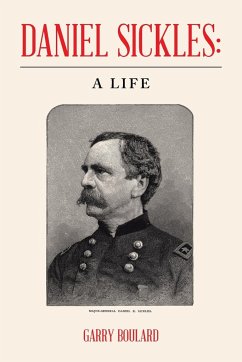The name Daniel Sickles and the word controversy are synonymous. Any student of 19th century American political history is familiar with Sickles' 1859 murder of Philip Barton Key, the son of Francis Scott Key, who had seduced Sickles' young wife. That murder, because Sickles was at the time a New York Congressman and Key a district attorney for Washington, captured the country's imagination, a front-page event that inevitably ensnarled President James Buchanan, a close Sickles friend, inviting in the process explorations of what was seen as a sordid Washington society of the late 1850s. Civil War historians know Sickles as the General who led the men of the Union's III Corps out onto the exposed expanse of the Peach Orchard at Gettysburg, a decision many scholars have regarded as disastrous, and one that nearly led to an overall Union defeat at the famous battlefield, while losing for Sickles his right leg from Confederate shelling. But these two singular, if spectacular events, in a very real sense represent only two days out of an extraordinary lifetime of 94 years. The rest of Sickles' career was made up of his rise as a young stalwart of New York's notorious Tammany Hall; his two terms in Congress leading up to the Civil War; his contentious service as a military governor of the Carolinas after the War; his newsworthy tenure as U.S. Minister to Spain in the late 1860s and early 70s; and even his stint, at the age of 70, as the sheriff of the county encompassing New York City. Beyond the headlines were Sickles' relationships with presidents ranging from Franklin Pierce to Abraham Lincoln and Ulysses S. Grant, not to mention an improbable friendship with Theodore Roosevelt at the turn of the century. Daniel Sickles: A Life is the first full-length published treatment looking in depth at the entirely of one man's almost unbelievably colorful and contentious career. Garry Boulard is the author of The Expatriation of Franklin Pierce-The Story of a President and the Civil War (iUniverse, 2006), and The Worst President-The Story of James Buchanan (iUniverse, 2015). Boulard's essays and reviews have appeared in the Journal of Southern History, Journal of Ethnic Studies, Louisiana History, Journal of Mississippi History, and Florida Historical Quarterly, among many other publications.
Hinweis: Dieser Artikel kann nur an eine deutsche Lieferadresse ausgeliefert werden.
Hinweis: Dieser Artikel kann nur an eine deutsche Lieferadresse ausgeliefert werden.








